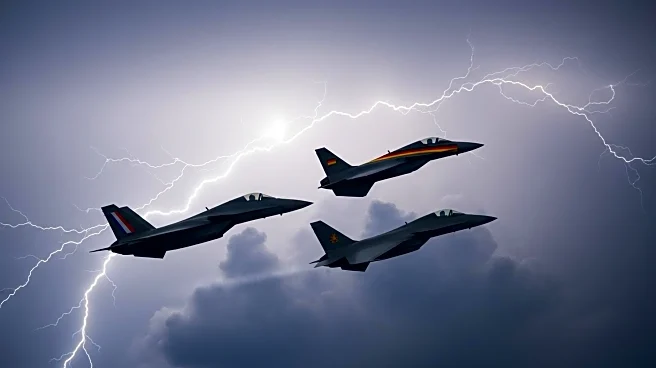What is the story about?
What's Happening?
France is actively seeking a mutually acceptable solution with Germany and Spain regarding the Future Combat Air System (FCAS) project. The French Armed Forces Ministry has expressed commitment to advancing the next phase of the program, which involves constructing a demonstrator of the combat aircraft central to the system. The initiative has faced challenges due to disagreements among industrial partners, particularly between Dassault Aviation and Airbus over work share. France has urged a redesign of the cooperation to enhance industrial leadership, aiming for the fighter to be operational by 2040. Despite these hurdles, France, Germany, and Spain remain determined to collaborate successfully on the FCAS program.
Why It's Important?
The FCAS project is crucial for European defense capabilities, aiming to develop a next-generation fighter aircraft that integrates advanced technologies such as AI and unmanned drones. Successful collaboration could strengthen Europe's strategic autonomy in defense and aerospace sectors. However, the ongoing disputes over work share and industrial leadership could delay the project, impacting the timeline for operational readiness. The resolution of these issues is vital for maintaining the project's momentum and ensuring that Europe can compete with other global powers in military technology advancements.
What's Next?
France, Germany, and Spain are working towards reaching a consensus by the end of the year. Discussions are ongoing, with Germany exploring potential cooperation with other countries like Sweden or the U.K. if current negotiations falter. The FCAS team is preparing for a decision by the end of 2025, which will be pivotal in determining the project's future direction. Stakeholders are closely monitoring these developments, as the outcome will influence Europe's defense strategy and industrial partnerships.
Beyond the Headlines
The FCAS project reflects broader trends in military technology, emphasizing systems of systems approaches that integrate crewed and unmanned elements. This shift towards networked combat capabilities highlights the increasing role of AI in defense, aiming to enhance decision-making and operational efficiency. The project's success could set a precedent for future collaborative defense initiatives in Europe, potentially reshaping the continent's defense landscape.















